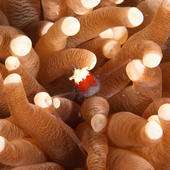World's most important corals unveiled

Towering furry pillars, glowing tentacles and species that look like human brains are listed among the ten most important coral species in the world.
Led by ZSL scientists, the most evolutionarily distinct and globally endangered (EDGE) tropical coral species have been identified at an international workshop of coral experts in response to over a decade of mass coral bleaching and destruction.
Current worst case predictions suggest that tropical coral reefs will be functionally extinct within the next 30 -50 years.
EDGE Coral Reefs includes corals that encompass all of the weird and wonderful features of tropical coral species and reflect the rich diversity of an ecosystem often referred to as the ‘rainforests of the oceans’. Saving these species could hold the key to the future adaptation of coral reefs to climate change.
Ten focal species have been prioritised including the pearl bubble coral (Physogyra lichensteini), which is a favoured food source of the hawksbill turtle and the Mushroom coral (Heliofungia actiniformis) that supports at least 15 brightly coloured shrimp including the popcorn shrimp (Periclimenes kororensis).
EDGE Coral Reefs’ species are found in some of the world’s most famous coral reefs, from the Great Barrier Reef to the waters surrounding the Chagos Archipelago. These prehistoric ecosystems have been around for 400 million years and support one third of all marine life, despite only inhabiting 0.2 per cent of the ocean floor.
Dr. Heather Koldewey, International Marine and Freshwater Conservation Programme Manager for ZSL, says “Corals are one of the most threatened groups of animals on our planet and iconic flagships of the marine environment. EDGE Coral Reefs will focus on improving the resilience of the world’s most diverse coral species, ensuring our coral reefs flourish in the future.”
The EDGE conservation team will now train in-country scientists to carry out vital conservation research on the ten focal species in order to develop a greater understanding of their status and determine the most effective methods for conserving them. These in-country conservationists will form a global network of ambassadors for coral reef conservation, helping to empower and assist local communities in managing reef resources.
Dr. David Obura, Chair of the IUCN Coral Specialist Group, says “The EDGE concept for corals comes at a crucial time. The unique approach of EDGE helps focus effort in places where unusual corals are found, thus helping to protect coral reefs as a whole from increasing impacts of climate change and over- extraction.”
More information: EDGE Coral Reefs will be launched at a ZSL Wildlife Conservation event ‘Life on the EDGE' taking place at ZSL, today, Tuesday 11 January, 2010.
Provided by Zoological Society of London
















